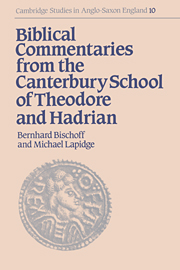Book contents
- Frontmatter
- Contents
- Preface
- List of abbreviations
- 1 Introduction
- 2 Archbishop Theodore
- 3 Abbot Hadrian
- 4 Theodore and Hadrian in England
- 5 The sources of the Canterbury biblical commentaries
- 6 The nature of the Canterbury biblical commentaries
- 7 The manuscripts
- Texts and translations
- Commentary to the texts
- Appendix I Additional manuscript witnesses to the Milan biblical commentaries
- Appendix II Two metrological treatises from the school of Canterbury
- Fig. 1 Cilicia and Syria
- Fig. 2 Constantinople in the seventh century
- Fig. 3 Churches and monasteries of seventh-century Rome
- Fig. 4 Cyrenaica and the Pentapolis
- Fig. 5 Campania and the Bay of Naples
- Fig. 6 Palestine
- Bibliography
- Index of Old English words quoted in the texts
- Index of Greek words quoted in the texts
- Index of names cited in the texts
- General index
Preface
Published online by Cambridge University Press: 08 January 2010
- Frontmatter
- Contents
- Preface
- List of abbreviations
- 1 Introduction
- 2 Archbishop Theodore
- 3 Abbot Hadrian
- 4 Theodore and Hadrian in England
- 5 The sources of the Canterbury biblical commentaries
- 6 The nature of the Canterbury biblical commentaries
- 7 The manuscripts
- Texts and translations
- Commentary to the texts
- Appendix I Additional manuscript witnesses to the Milan biblical commentaries
- Appendix II Two metrological treatises from the school of Canterbury
- Fig. 1 Cilicia and Syria
- Fig. 2 Constantinople in the seventh century
- Fig. 3 Churches and monasteries of seventh-century Rome
- Fig. 4 Cyrenaica and the Pentapolis
- Fig. 5 Campania and the Bay of Naples
- Fig. 6 Palestine
- Bibliography
- Index of Old English words quoted in the texts
- Index of Greek words quoted in the texts
- Index of names cited in the texts
- General index
Summary
In 1936 the late Bernhard Bischoff visited the Biblioteca Ambrosiana in Milan in search of manuscript materials pertaining to Virgilius Maro Grammaticus. This research led him to an eleventh-century compendium of biblical materials in that library bearing the shelfmark M.79 sup. Among the contents of this manuscript, lying adjacent to the excerpts of Virgilius which had first attracted his attention, were several series of unprinted Latin biblical commentaries, and he noted that they contained references to Theodore and Hadrian, and included glosses in Greek and Old English, as well as quotations from a wide range of unusual Greek patristic authors. Bischoff immediately recognized the extraordinary importance of these biblical commentaries, seeing in them – quite rightly, as our subsequent research has established – a product of the seventh-century Canterbury school of Archbishop Theodore and Abbot Hadrian described so memorably by Bede. The advent of war prevented him from publishing his discovery, and it was not until 1953, in his pioneering article ‘Wendepunkte in der Geschichte der lateinischen Bibelexegese’ (MS I, 205–73), that the existence of these Canterbury commentaries was first brought to public notice. At that time Bischoff announced an edition of the commentaries, but his many scholarly commitments and responsibilities prevented him from doing more than making a preliminary transcription of the text and initiating the difficult process of identifying the sources quoted in the commentaries. In this process he sought the assistance of several of his colleagues, and I am sure that he would have wished to record his warmest thanks for their assistance: Michel Aubineau, Edmund Beck, Sigrid Müller-Christensen and Franz Tinnefeld.
- Type
- Chapter
- Information
- Publisher: Cambridge University PressPrint publication year: 1995

